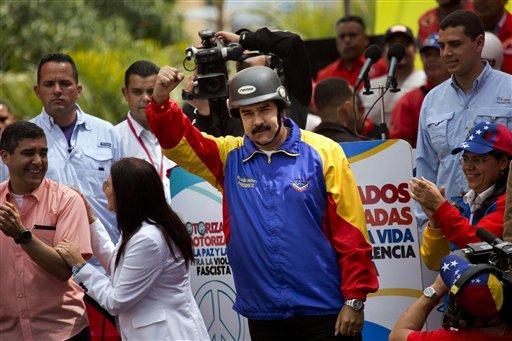Last week, Venezuelan President Nicolás Maduro wisely wrote an op-ed in The New York Times calling for peace. In the column, he sums up the short history of Hugo Chavez’s Bolivarian Republic and the successes it had in addressing poverty and the general apathy of the lower class in Venezuela.
In a post-Arab Spring world, it is easy to support and get behind every protest movement out there, but in the case of Venezuela, things aren’t that black and white. Our voice and vote matter if we use it. When our government intervenes behind our back in the affairs of other countries, it often blows back at us, according to the CIA.
Since the beginning of this year, the opposition rocked Venezuela with protests that at first started about addressing crime rates and corruption, but with the support of the U.S. and elite of Venezuela, they soon turned into a full-scale attempt to oust Maduro from office.
As one of the few leaders in the world to care for the poor, Maduro continues the social and economic policies of Chavez. This contrasts from the neoliberal policies of Venezuela before Chavez when the government only catered to the elite and multinational corporations.
As an American, this crisis in Venezuela concerns me because my government seeks regime change by almost any means necessary. There is a vivid history of regime change by the U.S., and Venezuela has been a victim of it over the past decade.
Before Chavez took power, Venezuela was similar to a dystopian America. There were only two parties, which both catered to the elites and multinational corporations and there was a whole sector of the population ignored because they had no means to influence politics like the rich could.
While the rich and upper middle class enjoyed the monopoly of political influence threw the two-party system, the majority of the country living in poverty saw a light at the end of the tunnel of oppression and poverty — Hugo Chavez.
Chavez’s election in 1999 changed the lives of the people. As Madura mentioned, poverty was cut in half and extreme poverty was also cut dramatically. Venezuela leads the entire region in reduction of poverty.
The most important change wasn’t just the drop in poverty, but the change in the political system. Today, Venezuela has an 80 percent turnout and an active political class that can’t go back to sleep anymore — the poor.
The opposition has several major concerns regarding the Bolivarian Republic: government oppression, inflation and creating communism.
Many Americans dislike the Venezuelan government because they shut down a TV station and arrested journalists. What Americans don’t talk about is that they shut them down because they participated in a coup against the government. Our own constitution lays out a remedy for people who participate in coup attempts, the death penalty for treason.
In the case of inflation, since most businesses are privately owned, many of the large retail giants hoard goods to push inflation artificially high. There are two mechanisms that drive prices high, the supply of goods decreasing and the increase in the money supply above goods.
The opposition has tried for more than a decade numerous non-democratic means to get rid of Chavez’s government.
It tried, with help from the United States, a coup d’état. The opposition launched a general strike in 2002 and 2003 that cost Venezuela $13 billion, it tried a recall vote that Chavez survived and now it is trying again by organizing a massive hoarding of goods to drive inflation even higher, which hurts the government’s base of support — the poor.
This isn’t a “Venezuelan Spring” because the opposition isn’t disenfranchised youths and poor people who seek to overthrow a tyrant who massacres people in the thousands. The opposition in Venezuela comes from the elite, multinational corporations and the upper middle class, who are all fighting to destroy the social democracy that the poor cherish.
Venezuela’s government spending is lower percentage-wise compared to France and Sweden, yet the opposition accuses Maduro of trying to turn Venezuela into Cuba, much like the Tea Party does here.
Maduro won a majority in 2013 after Chavez won four consecutive elections. Currently, Maduro’s party has 20 of 23 state governors and 242 of the country’s 337 mayorships. The Chavistas dominate politics because power has moved from the wallet to the ballot, from the bank accounts to the polling stations. In a democracy, the vote rules regardless of the minority liking it or not.
Joshua Hajiakbarifini is a 24-year-old political science and economics senior from Baton Rouge.
Opinion: Yes, Maduro seeks support from the American people.
April 7, 2014

FILE – In this Feb. 24, 2014, file photo, a helmet wearing Venezuelan President Nicolas Maduro cheers motorcyclists during a rally in support of his government in Caracas, Venezuela. Since Feb. 12, opponents of President Nicolas Maduro have been staging countrywide protests that the government says have resulted in scores of deaths and more than more than a hundred injured. The demonstrators blame Maduro’s administration for the country’s high crime rate and economic troubles. (AP Photo/Rodrigo Abd)




